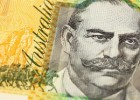Interesting, but follow the link and read the fine print and you’ll see that it’s really more a study of the effect of authoritarian parenting on sexuality than some sort of unified field theory about “homophobia.” In fact, it’s not fully clear to me from the news summary what would qualify as “homophobia” for purposes of the research. Sounds like they’re chiefly concerned with visceral dislike for gays, but I’m not sure; maybe, given the obvious political uses to which these results will be put, polite opposition to gay marriage also qualifies.
In which case, it’s a shame that we have a homophobic president, huh?
To explore participants’ explicit and implicit sexual attraction, the researchers measured the discrepancies between what people say about their sexual orientation and how they react during a split-second timed task. Students were shown words and pictures on a computer screen and asked to put these in “gay” or “straight” categories. Before each of the 50 trials, participants were subliminally primed with either the word “me” or “others” flashed on the screen for 35 milliseconds. They were then shown the words “gay,” “straight,” “homosexual,” and “heterosexual” as well as pictures of straight and gay couples, and the computer tracked precisely their response times. A faster association of “me” with “gay” and a slower association of “me” with “straight” indicated an implicit gay orientation.
A second experiment, in which subjects were free to browse same-sex or opposite-sex photos, provided an additional measure of implicit sexual attraction.
Through a series of questionnaires, participants also reported on the type of parenting they experienced growing up, from authoritarian to democratic. Students were asked to agree or disagree with statements like: “I felt controlled and pressured in certain ways,” and “I felt free to be who I am.” For gauging the level of homophobia in a household, subjects responded to items like: “It would be upsetting for my mom to find out she was alone with a lesbian” or “My dad avoids gay men whenever possible.”
Finally, the researcher measured participants’ level of homophobia — both overt, as expressed in questionnaires on social policy and beliefs, and implicit, as revealed in word-completion tasks. In the latter, students wrote down the first three words that came to mind, for example for the prompt “k i _ _.” The study tracked the increase in the amount of aggressive words elicited after subliminally priming subjects with the word “gay” for 35 milliseconds.
The theory is that kids with gay tendencies who grow up in very strict households may be so frightened of mom and dad’s disapproval that they compensate by developing a passionate aversion to gays themselves. Again: Interesting, but it’s a theory limited to a specific type of “homophobe,” not a universal explanation for why all critics of gays believe as they do. (As Live Science notes, “Ryan cautioned … that this link is only one source of anti-gay sentiments.”) Meanwhile, I’m curious why they didn’t use a more conclusive test of arousal, maybe involving, er, strategically placed sensors, to see which sex a given subject was most attracted to. Could be that that wasn’t possible with this test group simply because, if there were secretly gay members among them, they might have objected to a more invasive test for fear of being found out. But I don’t know. To the psychologists in our readership: How reliable are tests of “implicit” sexual attraction like this?
Exit question: Would the “authoritarian parent” explanation for vehement dislike of a particular group apply more broadly than just to sexuality? If, for instance, you’re raised in an authoritarian household that’s strictly religious, would a child who finds himself doubting his faith compensate with a powerful contempt for atheists/agnostics? If you don’t like that example, use a political scenario instead: In an authoritarian household that’s stridently liberal or conservative, would a kid who finds his sympathies trending the other way grow to hate that group to please his parents? (If so, does that mean some “true conservatives” have — gasp — latent liberal tendencies? And if so, doesn’t that mean the RINOs are the real conservatives? Good lord, suddenly I feel like the lost heir to Reagan.) I can think of reasons why sexuality might be unique — it forms earlier in most people than firm political/religious sympathies, it’s “felt” rather than thought through and therefore less amenable to being rationalized, and the social taboo against being gay is greater than the taboo against being liberal/conservative or atheist/agnostic (although maybe not dramatically so for nonbelievers in some communities). But I don’t know. This is why I ask.
















